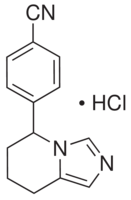| Product: | Fadrozole | |
|---|---|---|
| Catalog Number: | 17485 | |
| CAS Number: | 102676-47-1 | |
| Synonyms: |
Fadrozole hydrochloride; CGS 16949A; Afema; 4-(5,6,7,8-Tetrahydroimidazo[1,5-a]pyridine-5-yl)-benzonitrile |
|
| Pricing: |
|
|
| Formula: | C14H13N3 • HCl | |
| Chemical Purity: | >98% | |
| Molecular Weight: | 259.73 | |
| Structure: |

|
|
| Appearance: | Powder | |
| Category: | Anti-cancer compounds | |
| Stability: | Stable under recommended storage conditions | |
| Storage: |
Keep container tightly closed in a dry and well-ventilated place |
|
| Transportation: |
IATA: Hazard Class: 6.1; UN Number: UN2811; Packing Group: III; Shipping Name: Toxic solid, organic, n.o.s. (Fadrozole hydrochloride) |
|
| Literature References: |
Van Meeuwen, J., et al., Aromatase inhibition by synthetic lactones and flavonoids in human placental microsomes and breast fibroblasts--a comparative study. Toxicol. Appl. Pharmacol. 228, 269-276, (2008); Minnaard-Huiban, M., et al., Fadrozole reverses cardiac fibrosis in spontaneously hypertensive heart failure rats: discordant enantioselectivity versus reduction of plasma aldosterone. Endocrinology 149, 28-31, (2008); Mikolajczyk, T., et al., The effect of aromatase inhibitor, fadrozole, on sGnRHa stimulated LH secretion in goldfish (Carassius auratus) and common carp (Cyprinus carpio). Reprod. Biol. 6, 195-199, (2006); Merck 14,3927 |
|
| MSDS: | ||
| Description: |
Fadrozole is a nonsteroidal aromatase inhibitor. Fadrozole is a very potent and highly selective inhibitor of the aromatase enzyme system in vitro and estrogen biosynthesis in vivo. It inhibited the conversion of [4-14C]androstenedione to [4-14C]estrone by human placental microsomes in a competitive manner (Ki = 1.6 nM). At a substrate concentration 3-fold the Km, Fadrozole was 180 times more potent, as an inhibitor, than aminoglutethimide (Cat. No. A9657), exhibiting half-maximal inhibition at 1.7 nM as compared to 0.3 μM. In vivo, Fadrozole lowered ovarian estrogen synthesis by gonadotropin-primed, androstenedione treated, immature rats by 90% at a dose of 260 μg/kg (PO). In vivo, Fadrozole leads to sequelae of estrogen deprivation (e.g. regression of DMBA-induced mammary tumors) without causing adrenal hypertrophy in adult rats. It blocked aromatase by 50% in human breast cancer homogenates, live breast cancer cells, human placental microsomes, and porcine ovarian microsomes at concentrations of 0.008 to 0.02 μM. |
